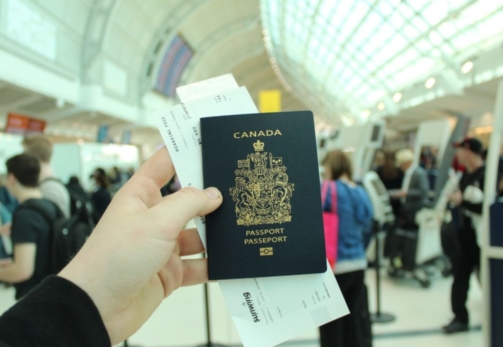Pars National
Services for Canadian Citizenship

A Canadian citizen is someone who has obtained Canadian nationality under Canadian laws and regulations. To do this, a person must go through a specific process that includes stages such as immigrating to Canada, obtaining permanent residency, and then applying for citizenship. To obtain Canadian citizenship, a person usually needs to meet certain conditions, including having permanent residency status, permanent housing in Canada, compliance with language and socio-cultural proficiency standards, and security and criminal matters. Once sure that the person meets the necessary conditions, they can apply for Canadian citizenship, and after successful processing, become a Canadian citizen.
After receiving citizenship, a person will have various rights and benefits, including the right to vote in elections, the right to travel freely to most countries, the right to work and study without needing a visa permit in other countries, and more.
Benefits of Canadian Citizenship
Right to Vote and Political Participation: Canadian citizens have the right to vote in federal, provincial, and local elections and can participate in the country’s political decision-making process.
Legal Rights: Canadian citizens enjoy fundamental rights and freedoms such as civil rights, political rights, and human rights.
Housing Opportunities: Canadian citizens have access to various housing programs and facilities, allowing them to easily acquire their own homes.
Family Rights: Canadian citizens can sponsor their relatives to immigrate to Canada and benefit from various family visa programs.
Education and Employment Opportunities: Canadian citizens can easily pursue education at all levels in the country and have access to a wider range of job opportunities.
Healthcare Rights: Canadian citizens benefit from the country’s healthcare system and can access medical services either for free or at reduced costs.
Easy Travel: Canadian citizens hold Canadian passports, allowing them to travel to most countries worldwide.
These are just a few examples of the benefits of Canadian citizenship, and there is a much longer list of advantages and rights associated with Canadian citizenship.
Does Canadian Citizenship Expire?
No, Canadian citizenship does not expire. This means that once a person becomes a Canadian citizen, this status remains permanent and without an expiry date, unless their citizenship is revoked for serious and exceptional reasons.
Under current Canadian laws, citizenship may be revoked in cases such as evading military service or betraying Canada. However, these cases are very rare, and there are legal and complex procedures for citizenship revocation.
Therefore, in general, Canadian citizenship usually remains permanent and without an expiry date for individuals.
Can Canadian Citizenship Be Revoked?
Yes, Canadian citizenship may be revoked in certain circumstances. This often occurs for serious and irreparable reasons. Some factors that may lead to the revocation of Canadian citizenship include:
- Fraud or misrepresentation in the citizenship process: If the information provided for citizenship application is false or if a person abuses the Canadian citizenship system to obtain citizenship in another country, citizenship may be revoked.
- Involvement in terrorist activities or treason against Canada: If a Canadian citizen participates in terrorist activities or poses a threat to Canada’s security, their citizenship may be revoked.
- Serving in the military forces of another country during wartime: Canadian citizens serving as soldiers or members of the military forces of another country during wartime may lose their citizenship.
- Using fraud or criminal activities to obtain citizenship: If it is proven that fraud or criminal activities were used to obtain citizenship, it may lead to citizenship revocation.
Regarding individuals born in Canada: They are considered Canadian citizens and have the rights and privileges of a Canadian citizen. This includes the right to vote, civil rights, political rights, and other citizenship-related rights and benefits. However, in some exceptional cases, Canadian citizenship of a person born in Canada may be revoked, but these cases are very rare and complex and usually involve serious criminal activities or unlawful activities. Therefore, in general, a person born in Canada is recognized as a Canadian citizen and has the rights and benefits associated with citizenship, and their citizenship is usually not revocable.
Revoking citizenship is a complex process and is often applied in serious and exceptional cases. Before citizenship is revoked, the individual has the right to defense and due process, and they may be given the opportunity for review and explanation.
Pars National is your passport to Canada.

Provincial Nominee Program
Individuals with specific skills and expertise, by choosing the provincial route in the PNP, will have a better chance of obtaining permanent residency in a province that needs their skills or expertise. By participating in the provincial program...

The Quebec Investor Program
The Quebec Investor Program is passive in nature, meaning that applicants don't need to create or actively manage a business in the province of Quebec, unlike some other immigration programs.

Family Sponsorship Immigration
In this way, a Canadian sponsor commits to financially and socially supporting the immigrant during their stay in Canada. This type of visa makes the immigration process simpler and more secure by providing support from a local sponsor.




